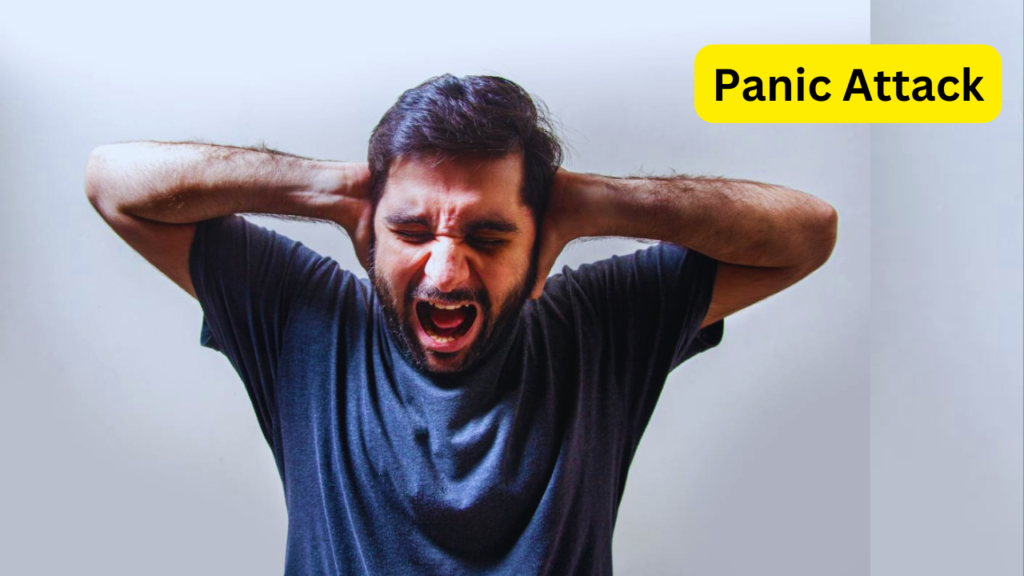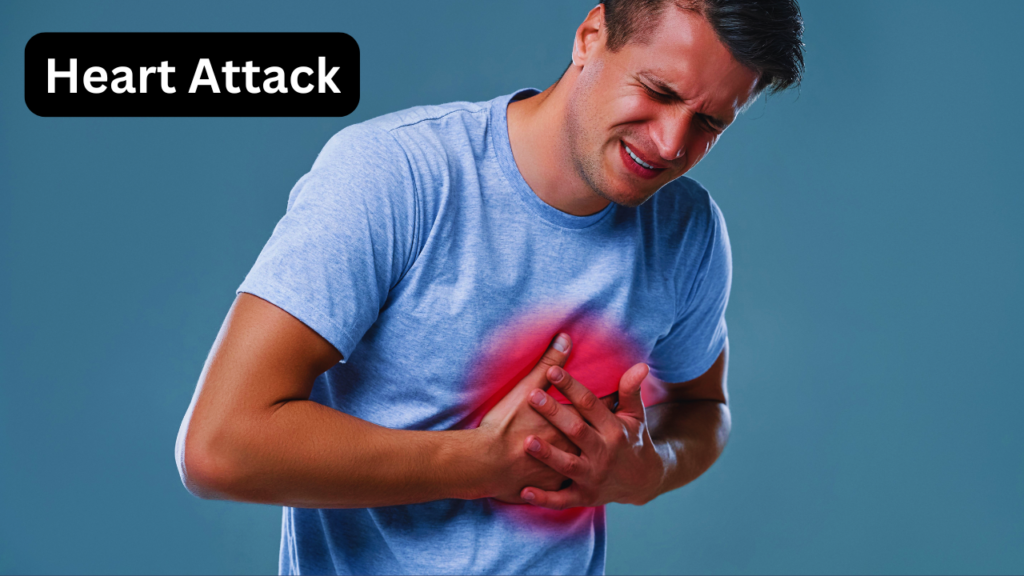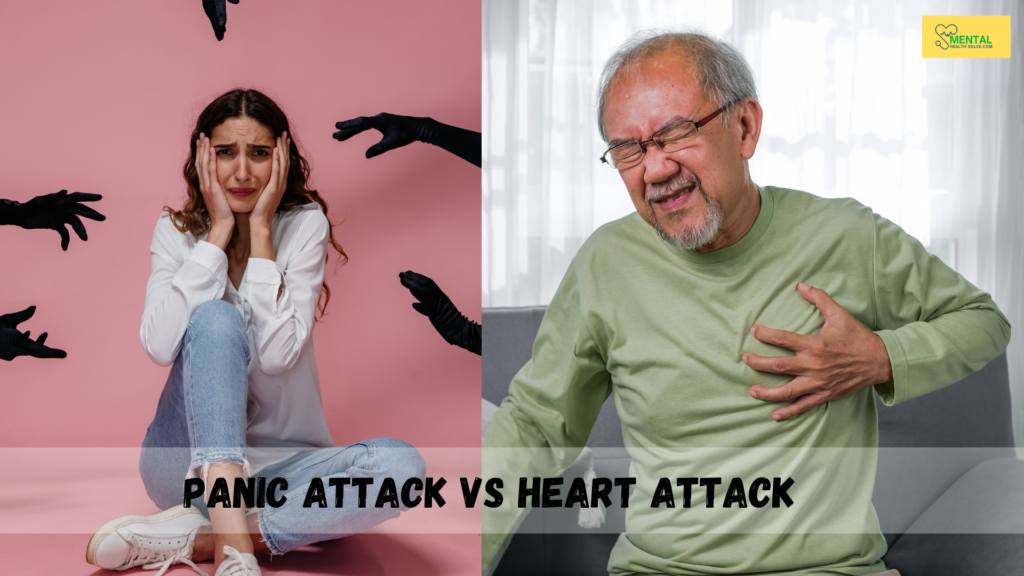In a broader health context, people suffer from many minor to severe health conditions daily. Different communicable and uncommunicable diseases show their scenarios. Distinguishing between those is sometimes more straightforward, as some can be identified by seeing symptoms, whereas some need an expert or professional, and some need specific screenings. In terms of Panic attack vs Heart attack one of the common confusion among people to identify the key symptoms of panic attack vs heart attack.
Among the following similar patterns of illness are panic attack vs heart attack. Identifying the key differences between Panic attack vs Heart attack is essential for ensuring the correct response and fast treatment. Both are fatal conditions, but the delay in identification has become severe.
Global Concern of Panic attack vs Heart attack
Globally, the concern about panic attack vs heart attack is increasing. While the chest pain, shortness of breath, and dizziness brought about by a heart attack and panic attack are the same, they often lead to confusion and fear but differ as to their causes and health impact.
For example, a panic attack is usually caused by intense anxiety and stress; it lasts for a couple of minutes, and it usually goes away without any physical harm. By comparison, a heart attack is a sudden blockage of the blood flow to the heart, which calls for immediate medical care. On a global scale, both the conditions mentioned above are becoming serious.
Heart disease, even though it is still the top cause of death, is now accompanied by panic disorders and anxiety-related conditions, which are on the increase due to stress, lifestyle changes, and mental health difficulties.
An understanding of triggers, symptoms, and when to seek help are things that can not only save lives but also improve overall well-being. According to the CDC, around 805,000 Americans experience a heart attack each year.
In contrast, Studies estimate the lifetime prevalence of panic disorder in US adults to be between 2% and 6%, meaning a much higher percentage of people will experience a panic attack at some point in their lives compared to a heart attack.

What is a Panic Attack?
Panic Attack is a wide range of mental conditions, including anxiety, stress, depression, or other physical conditions like dizziness, nausea, breathlessness, etc. Usually, it is not harmful, but in some cases, it can lead to severe conditions. A panic attack usually lasts for a few minutes. There are some trigger points like Stress, Biological & Genetic Factors, Anxiety disorders, Caffeine, Alcohol, Post-traumatic situations, Failed relations, etc.
Key symptoms include:
- Rapid heartbeat
- Shortness of breath
- Chest pain
- Dizziness & sweating
- The feeling of impending doom

What is Heart Attack?
A heart attack is a myocardial infarction, also called cardiac arrest. It is a prominent cardiovascular disease in the USA. It is caused when oxygenated blood flow doesn’t go into the arteries due to fat blockage. The process of blood flow is interrupted.
If a healthcare provider doesn’t restore blood flow quickly, a heart attack can cause permanent heart damage, heart failure, or even death.
Key symptoms include:
- chest pain
- Angina
- shortness of breath
- pain in your neck, shoulders, jaw, or arms
- feeling faint or dizziness
- feeling sick (nausea)
- Blurred vision
Panic Attack vs Heart Attack: Key Differences
One of the main goals of teaching people about the differences in these conditions is to stop the misinterpretation of symptoms, which can cause excessive panic or result in delayed medical care. While both can share similar symptoms like chest pain and rapid heartbeat, identifying a key difference is necessary. There are the key differences between Panic Attack vs Heart Attack
| Key Feature | Panic Attack | Heart Attack |
| Pain Type | Sharp, Stabbing, Dizziness | Breathlessness, Pressure, squeezing |
| Duration | Last for 5-30 minutes | Can last longer or cause death |
| Detection | Self QNA or a healthcare professional can identify | Screening facilities like ECG, Echocardiogram, MRI, etc. |
| Treated by | Mental health technicians like Psychiatrist, psychologist or neurologist | Heart surgeon, cardiologist |
| Medication | Counseling or therapy (CT, DT) etc | Immediate medication, angioplasty, use of pacemakers, open heart surgery etc. |
| Triggered By | Stress, Anxiety | Hypertension, Blocked arteries |
| Breathing | Hyperventilation | Shortness of breath |
| Relief | Improves with relaxation | Require proper medical care |

Risks Associated with Panic Attacks vs Heart Attacks
Panic attacks vs heart attacks are almost the same in their symptoms. They also cause each other. Besides, they are also caused by physical stress and high blood pressure, Smoking, alcohol, etc. In panic attacks, the person’s breathing and heart rate can stall with more severe cases of post-traumatic stress.
Panic attacks can lead to heart attacks, and besides that, they can also lead to mental halters like Alzheimer’s, stroke, and many other neurological disorders. Diagnosis mistakes are the main risk for both. Yet, a heart attack meant untimely death, which means immediate medical attention was required for this type of clinical condition. In contrast, a panic attack is not life-threatening but can render mental health dysfunctional if not appropriately managed.
There are a lot of misconceptions, and threats observed if you can’t diagnose the difference between panic attack vs heart attack, and the ultimate result can brings a lot of associated risk factors.
Misdiagnosing can be a threat.
One of the threatening factors of Panic attack vs heart attack is misdiagnosing. A misdiagnosis of a panic attack as a heart attack can cause some of the patients to go to the emergency department unnecessarily and have them feel more anxious while confusing a heart attack for a panic attack can have fatal consequences because the person would not go to the doctor on time due to a lack of medical treatment, which would further result in complications or death.
However, a heart attack is life-threatening and requires immediate medical attention. In contrast, a panic attack is typically not fatal but can still severely impact mental health if not managed properly. Misdiagnosing a panic attack as a heart attack can cause unnecessary ER visits and heightened anxiety, while mistaking a heart attack for a panic attack can lead to dangerous delays in medical treatment, increasing the risk of severe complications or death.
The Most Effective Solutions to Panic Attacks
In terms of Panic attack vs Heart attack, panic attacks are not life-threatening; they are harmful to mental health and daily life. Only appropriate treatment can help decrease the number of panic attacks and their severity.
• Stress Management: Exercising regularly, yoga, and meditation can truly lower your anxiety level.
• Mindfulness and Breathing Techniques: Deep breathing (4-7-8 technique) helps a lot, and grounding exercises are wonderful for relaxing before meditation.
• Healthy Diet: Caffeine, alcohol, and processed food should be avoided, as they can make one feel jittery when anxious. Also, eat a diet balanced with fresh fruits and vegetables.
• Enough Sleep and lifestyle maintenance: Proper 6-8 hours of sleep daily can prevent the occurrence of sickness.

Therapies & Medications (Clinically Proven Treatments)
Their symptoms are pretty similar, and both are associated with each other as they are both triggered by physical and mental stress, hypertension, Smoking, alcohol, etc. Most of the time, panic attacks can lead to cardiac arrest with severe conditions or post-traumatic stress. Again, heart attacks can also cause panic attacks and mental illnesses like Alzheimer’s, stroke, and many neurological disorders. Here are some clinically proven therapies and medications to prevent panic attacks. In terms of Panic attack vs Heart attack all of these practices can be used.
Cognitive Behavioral Therapy (CBT) – The most effective psychological treatment for panic disorder. Helps reframe negative thoughts and reduce attack frequency.
Selective Serotonin Reuptake Inhibitors (SSRIs) – Commonly prescribed antidepressants (e.g., Sertraline, Fluoxetine) to manage anxiety long-term.
Benzodiazepines – Fast-acting medications (e.g., Xanax, Ativan) that help stop panic attacks but should be used short-term due to dependency risks.
Emergency Response to Heart Attacks
In terms of Panic attack vs Heart attack, A heart attack is more serious. It is a medical emergency requiring immediate intervention and long-term management to prevent future episodes. Here are some immediate actions for the call.
Call 911 immediately – A heart attack needs urgent medical attention.
Take aspirin (325mg) – Helps thin the blood and prevent further clotting.
Use nitroglycerin (if prescribed) – Helps widen blood vessels to improve blood flow.
Perform CPR (if the person is unresponsive and not breathing).
ACE Inhibitors – Helps control blood pressure and heart function.
Lifestyle Changes: Such as a Heart-Healthy Diet, Low lipid diet, replace essential fatty acids with unsaturated fatty acids. Also, regular exercise, physical activities, yoga, and meditation can reduce the future risk. And must quit Smoking & control Alcohol.

Recommended Services:
In terms of Panic attack vs Heart attack, we need some fast recommendations that can be used by general people.
Here are some recommendations for panic attack vs heart attack.
- Online Therapy Platforms like BetterHelp, Talkspace
- Telehealth Consultations, such as finding licensed therapists and psychiatrists online
- Anxiety Tracking Apps. such as Calm–Headspace, MindShift, CBT
- Wearables & Smart Devices: Apple Watch (Heart rate monitoring & Stress Monitoring).
- Blood Pressure & Oxygen Monitoring Devices: Such as Omron Platinum BP Monitor, Withings BPM Connect, Wellue O2Ring
- Mental Health Apps & Wearables for anxiety management
- Smart Heart Health Devices
- Online Doctor Consultations
Final Thoughts
Both panic attacks vs heart attacks are severe and need prompt and continuous health care. Even though panic attacks are treatable with therapy, drugs, and relaxing methods, heart attacks are prone to urgent medical intervention at once and long-term health monitoring.
Therefore, by differentiating the symptoms of both the attack conditions, we will undoubtedly be more attentive and thereby get the means to avoid the risk of death if timed care is not provided. In terms of Panic attack vs Heart attack, both identify signs and symptoms, and diagnosing is a must.
